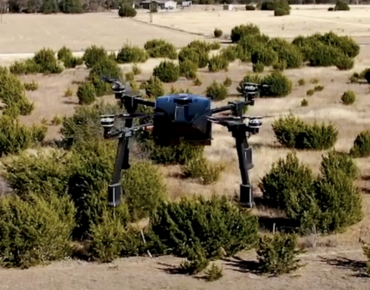AI-Based Cyber Defenses Secure Drones From Zero-Day Attacks

Vulnerable to hacking, drones are getting another layer of defense via an AI-based cybersecurity approach that promises to shield the flying edge devices from zero-day attacks.
SparkCognition, an industrial AI specialist, said this week the SkyGrid unit it formed with Boeing Co. has developed an AI-based cyber defense for drones that would detect attacks during flights, allowing operators to intercept hacked vehicles. The cyber AI approach is billed as more secure than standard anti-malware defenses that rely on identifying known threats.
The AI shield is integrated with SkyGrid’s AerialOS flight management system, allowing it to be deployed in drone hardware and potentially operate when network connectivity is cut. Hacks on drone RF links have made them particularly vulnerable to attack.
The partners said Tuesday (Jan. 19) their autonomous approach protects drones using models trained on malicious file data rather than databases of known threats. The cyber defense is designed to thwart zero-day exploits in which software or hardware flaws can be exploited before the vulnerability is discovered.
The AI defense, dubbed DeepArmor, is designed to secure network “endpoints” such as drones from “99.9 percent of never-before-seen threats,” claimed Sridhar Sudarsan, SparkCognition’s CTO. The company said it was able to integrate its lightweight AI cyber defenses directly onto a drone without a weight penalty. It also claims minimal interference between drone and operator. Sudarsan said the technology could eventually protect drones operating in “unconnected environments.”
The AI approach replaces known threat signatures and rules-based approaches with proprietary machine learning technology. SparkCognition said the software can be used to protect a range of network endpoints. Besides drones, the Austin-based startup is working with industrial and energy partners like Siemens to secure operational assets.
The scheme uses AI models to analyze payload characteristics, utilizing data stored either permanently or in-memory. Hence, the cyber tool does not require prior knowledge of a specific threat to generate a classification.
Testing the system included simulating a cyberattack by attempting to inject a malicious payload into a drone flying a prescribed mission. Any payloads or processes found to be malicious aborted a mission, with all data being encrypted and the drone “quarantined” at a secure location, the company said.
Boeing and SparkCognition launched their SkyGrid joint venture in 2018 to develop an AI- and blockchain-based airspace management software application. The platform is aimed at securing delivery drones as well as passenger aircraft. “We’ve been able to bring cybersecurity to the edge,” said Ali Husain, SkyGrid’s chief software architect.
In December, SparkCognition said its DeepArmor platform was used to detect and prevent an attack by a new strain of malware known as PowerPepper.
Related
George Leopold has written about science and technology for more than 30 years, focusing on electronics and aerospace technology. He previously served as executive editor of Electronic Engineering Times. Leopold is the author of "Calculated Risk: The Supersonic Life and Times of Gus Grissom" (Purdue University Press, 2016).










